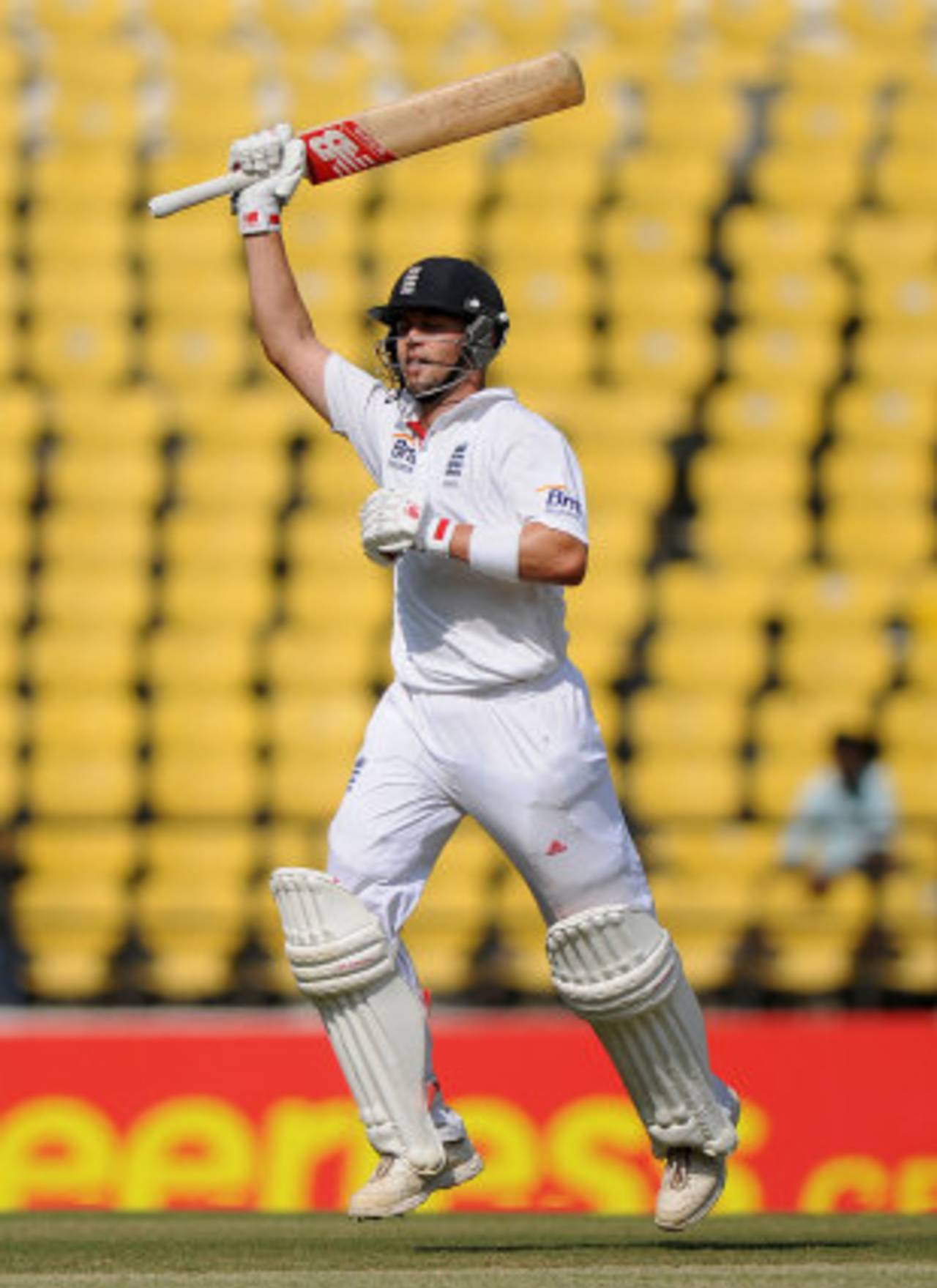The contrasting fortunes of two men told the story of
this game and the current position of their respective sides. While one,
Jonathan Trott, finished a difficult year with a series-clinching century, the other,
Sachin Tendulkar, ended it in the dressing room suffering from a sore neck and shoulders. When you have carried the hopes of a nation for two decades, these things will happen.
It was fitting that Trott should seal the result. His difficulties have reflected those of his side throughout the year. Starting 2012 with a big reputation, he was brought down to earth in the UAE and struggled against Dale Steyn in the series against South Africa. But the selectors stuck with him, he worked hard and he overcame. This was his eighth Test century and his first since Galle in March. He also passed 1,000 Test runs for the year during this innings.
The hour after lunch was a golden one for England. To see two batsmen stretch their partnership past 200, answer the questions about their form and slam the door on any lingering Indian hopes was to see the rehabilitation of this England side. This success does not make up for a disappointing year and England are not the finished article but they, at least, back on track.
For this series victory represents one of the finest in England's history. It will not make the impact of an Ashes victory - it does not have the history or capture the British public imagination in the same way - but, in the circumstances, this is as least as impressive an achievement as winning the Ashes in Australia for the first time in 24 years in 2010-11 and winning the World T20 in the Caribbean in 2010.
Everything was weighted against them: India's home record; England's record in Asia and India in particular; England's record against spin; the loss of Steven Finn; the loss of three important tosses; the preparation of the pitches; the lack of spin provided to them in the warm-up games; and defeat in the first Test of the series.
And yet England won. They won a series in India for the first time since 1984-85; they won a series in Asia (excluding those in Bangladesh) for the first time since 2001; they won in a country where they had won just one Test since 1985; their batsmen showed they had learned to play spin; their bowlers proved more adept than the hosts' on pitches made to suit India; and they showed the spirit to fight back from the loss
in Ahmedabad. A series that began under the cloud of Pietersen-gate, ended with a unified team dealing calmly and positively with every obstacle placed in their way. In stark contrast to earlier tours, not once did an England player complain about the pitches, the hotels, the heat or the tactics. They simply embraced a no-excuse environment and got on with it.
It was Alastair Cook that led the way. His century in Ahmedabad, in vain though it was, showed his colleagues what could be achieved. Gradually more players contributed in each Test.
In Mumbai, Kevin Pietersen played an innings laced with genius and Monty Panesar - described by Cook as "a captain's dream" - showed his quality.
In Kolkata, Trott rediscovered his form, James Anderson - who took three times as many wickets as the next most successful seamer and was
described as "the major difference between the sides" by MS Dhoni - his nip and Steven Finn demonstrated his value; then in Nagpur Joe Root showed his promise and Ian Bell provided a reminder of his class. Through it all, Cook, Matt Prior and Graeme Swann performed with understated excellence.
Bell recovering his form saw one of the final pieces fall into place in England's jigsaw. It had been 25 Test innings since his last century and, before this, he had averaged 18 in India on his three tours. While the latter portion of his innings was somewhat soft, the initial part was important: had he or Trott fallen early, India would have had an opening. It would be wrong to diminish the importance of this, his 17th Test century.
Andy Flower will, quite rightly, gain many plaudits. But it is worth recalling the influence of Peter Moores, too. It was Moores who gave big breaks to Swann, Anderson and Prior and Moores who first called-up Trott into the England limited-overs set-up. It was Moores, too, who set-up the Academy and Lions systems that have helped the likes Finn and Root move seamlessly from the county to the international game. He really is one of the unsung heroes of England cricket.
Perhaps it was fitting, too, that Tendulkar should finish the series on the treatment bench, figuratively if not literally. He now represents the old India. A team that, whatever their past excellence, is now tired and in need of refreshing. He deserves to depart on a grander stage than this drab draw on an awful pitch at Nagpur, but 'deserve' has little to do with it. His reputation, as a player and ambassador for the game is assured, but time defeats us all. The success of Cheteshwar Pujara has shown there is talent and dedication available in India. It just requires a culture change to realise it.
